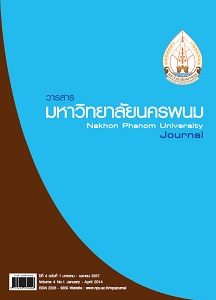การพัฒนาความพร้อมทางสติปัญญาของเด็กปฐมวัยชั้นอนุบาลปีที่ 2 โดยการจัดประสบการณ์ตามแนวทฤษฎีพหุปัญญา
Main Article Content
Abstract
การวิจัยครั้งนี้มีวัตถุประสงค์เพื่อ 1) ศึกษาประสิทธิภาพของแผนการจัดประสบการณ์การเรียนรู้ตามแนวทฤษฎีพหุปัญญาของ เด็กปฐมวัยชั้นอนุบาลปีที่ 2 ตามเกณฑ์ 80/80 2) ศึกษาดัชนีประสิทธิผลของแผนการจัดประสบการณ์การเรียนรู้ตามแนวทฤษฎี พหุปัญญา ของเด็กปฐมวัยชั้นอนุบาลปีที่ 2 3) เปรียบเทียบความพร้อมทางสติปัญญาของเด็กปฐมวัย ชั้นอนุบาลปีที่ 2 ที่ได้รับการจัด ประสบการณ์ตามแนวทฤษฎีพหุปัญญา ระหว่างก่อนและหลังการจัดประสบการณ์ 4) ศึกษาความพึงพอใจของเด็กปฐมวัยชั้นอนุบาล ปีที่ 2 ที่มีต่อการเรียนรู้ตามแนวทฤษฎีพหุปัญญา กลุ่มตัวอย่างได้แก่ เด็กปฐมวัย ชั้นอนุบาลปีที่ 2 โรงเรียนบ้านใหม่สามัคคี สังกัด สำนักงานเขตพื้นที่การศึกษาประถมศึกษาบึงกาฬ ภาคเรียนที่ 2 ปีการศึกษา 2554 จำนวน 22 คน ได้มาโดยสุ่มอย่างง่าย เครื่องมือที่ใช้ ในการวิจัยประกอบด้วย 1) แผนการจัดประสบการณ์การเรียนรู้ตามแนวทฤษฎีพหุปัญญา มีความเหมาะสมอยู่ในระดับมากที่สุด ( = 4.00-4.80) 2) แบบทดสอบความพร้อมทางสติปัญญาของเด็กปฐมวัย ชนิด 3 ตัวเลือก จำนวน 20 ข้อ มีค่าความยากระหว่าง 0.43 ถึง 0.70 ค่าอำนาจจำแนกระหว่าง 0.28 ถึง 0.78 และค่าความเชื่อมั่นทั้งฉบับเท่ากับ 0.83 3) แบบสอบถามความพึงพอใจของ เด็กปฐมวัยชั้นอนุบาลปีที่ 2 ที่มีต่อการจัดประสบการณ์การเรียนรู้ตามแนวทฤษฎีพหุปัญญาเป็นแบบมาตราส่วนประมาณค่า 3 ระดับ จำนวน 10 ข้อ มีค่าอำนาจจำแนกระหว่าง 0.41 ถึง 0.67 และค่าความเชื่อมั่นทั้งฉบับเท่ากับ 0.75 สถิติที่ใช้ในการวิเคราะห์ข้อมูล ได้แก่ ร้อยละ ค่าเฉลี่ย ส่วนเบี่ยงเบนมาตรฐาน และทดสอบสมมติฐานโดยใช้ t-test (Dependent Samples) ผลการวิจัย พบว่า 1) แผนการจัดประสบการณ์ตามแนวทฤษฎีพหุปัญญาที่ได้พัฒนาขึ้นมีประสิทธิภาพเท่ากับ 81.64/84.31 ซึ่งเป็นไปตามเกณฑ์ 80/80 ที่กำหนดไว้ 2) แผนการจัดประสบการณ์ตามแนวทฤษฎีพหุปัญญามีค่าดัชนีประสิทธิผลเท่ากับ 0.7940 ซึ่งหมายความว่า คะแนนหลัง การจัดประสบการณ์สูงกว่าก่อนการจัดประสบการณ์ คิดเป็นร้อยละ 79.40 3)เด็กปฐมวัยที่เรียนรู้ด้วยแผนการจัดประสบการณ์ตามแนว ทฤษฎีพหุปัญญามีความพร้อมทางสติปัญญาหลังการจัดประสบการณ์สูงกว่าก่อนการจัดประสบการณ์อย่างมีนัยสำคัญทางสถิติที่ระดับ .01 4)เด็กปฐมวัยชั้นอนุบาลปีที่ 2 มีความพึงพอใจต่อการเรียนตามแนวทฤษฎีพหุปัญญา โดยภาพรวมอยู่ในระดับมาก (mean = 2.71)
The purposes of this study were : 1) to investigate efficiency of the learning experience provision plan for second-year kindergarten pupils based on the theory of multiple intelligence approach according to the 80/80 criterion, 2) to examine an effectiveness index of the learning experience provision plan for second-year kindergarten pupils based on the theory of multiple intelligence approach, 3) to compare cognitive readiness of second-year kindergarten pupils who were provided with experience based on the multiple intelligence approach with that of the pupils between before and after getting the treatment, and 4) to examine second-year kindergarten pupils’ satisfaction of learning based on the theory of multiple intelligence approach. k The sample was 12 second-year kindergarten pupils enrolled in the second semester of academic year 2011 at Ban Mai Samakkhi School under the Office of Bueng Karn Primary Education Service Area. The instruments used comprised : 1) learning experience provision plans based on the theory of multiple intelligence approach, of which appropriateness was at the highest level (means = 4.00 – 4.80), 2) a 20-item test of kindergarten pupils’ cognitive readiness with 3 choices, whose difficulty values ranged between 0.40 and 0.70, discrimination power values between 0.28 and 0.78, and entire reliability value was 0.83, and 3) a 3-rating scale questionnaire with 10 items of second-year kindergarten pupils’ satisfaction with learning experience provision based on the theory of multiple intelligence approach, whose discrimination power values ranged between 0.41 and 0.67 and entire reliability value was 0.75. Statistics used to analyze data were percentage, mean, standard deviation, and t-test (dependent samples) for hypothesis testing. The findings revealed: 1) the developed experience provision plans based on the theory of multiple intelligence approach had the efficiency index of 81.64/84.31 which met the set criterion of 80/80, 2) the experience provision plans based on the theory of multiple intelligence approach had the effectiveness index value of 0.7940. Its means that the score gained after experience provision was 79.40 percent higher than that gained before experience provision, and 3) the kindergarten pupils that learned through experience provision plans based on the theory of multiple intelligence approach had significantly higher cognitive readiness after experience provision than that before experience provision at the .01 level, and 4) the second-year kindergarten pupils had satisfaction with learning based on the theory of multiple intelligence approach as a whole at the high level (mean = 2.71).


